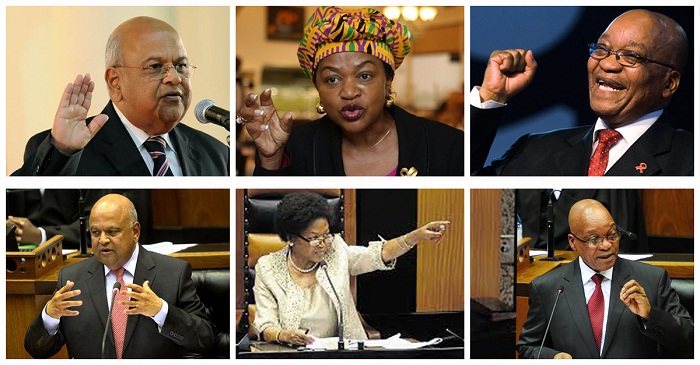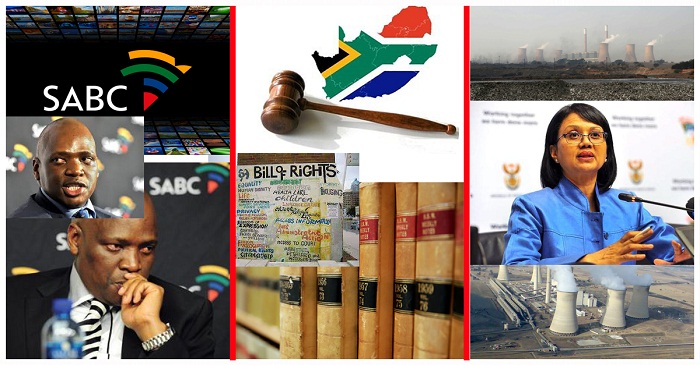Parliament: What to expect in 2017?
2017 promises to be another busy and turbulent year in Parliament. Everything from specific scandals to legal and legislative battles to big-picture policy and foreign matters will be under the microscope. Also, high on the agenda are bread and butter issues, domestic challenges, the state of the economy and public accountability. In this piece we take out our crystal ball to predict some of the main issues and stories that will dominate the headlines this year.
That said there is one proviso: this is not an exhaustive list and all of what follows can be overshadowed and overtaken by unscheduled debates, statements and events.
More wrangling & tit-for-tat battles
It's not hard to predict this one. A big feature of the Fifth Parliament has been the acrimony and tension between the ruling party and opposition parties. The year has barely started and we already have finger-pointing, squabbles, brinkmanship and jousting. This is likely to continue (and perhaps even escalate) as parties try to one-up each other to win public support. In the past two years, the State of the Nation Address has set the tone for the rest of the year: parties either walked out or were thrown out of the event. What are the chances of history repeating itself?

Appointments
There are some big and important appointments that must be made this year. This includes filling vacancies at the CGE, NYDA, ICASA and MDDA and other statutory bodies. Most notably, the Portfolio Committee on Communications will appoint an interim and permanent SABC board.
The appointment process for the Public Protector set a precedent for openness and transparency. Since then Parliament has followed the same course for other statutory appointments. In practice, this means that the CVs of candidates are published and the public's involvement is not limited to merely nominating. Notwithstanding this achievement, there are question marks about vetting, criteria for selection and the political affiliations of candidates.
There will be other fights over the leadership of key institutions such as the National Prosecuting Authority, Hawks, Independent Police Investigative Directorate, South African Police Service, the South African Revenue Service and South African Airways.
Legislation
There are almost 30 bills in the highways and byways of Parliament and it is anticipated that a number of them will be finalised in the first term.
Many departments have plans to introduce legislation so lawmakers will be doing some heavy legislative lifting this year. These vary from the mundane to the important and controversial. The Repeal of the International Criminal Court Act has been the first of the new Bills to be lodged in 2017.
The processing of the Copyright Amendment Bill, Traditional Courts Bill, Cybercrimes and Cybersecurity Bill, Regulation of Landholdings Bill, Broadcasting Amendment Bill and Liquor Amendment Bill is expected to be difficult and their passage is likely to be fraught.
Likewise, the draft Prevention and Combating of Hate Crimes and Hate Speech Bill has generated a lot of debate. This proposed law has been described as too broad, and there are concerns that it will have severe implications on freedom of speech.
The accumulating amendments and new clauses that assorted MPs want to attach to the Films and Publication Amendment Bill means that it is significantly different to the one introduced and in terms of the rules, the Committee needs to obtain permission from the National Assembly to extend the subject matter of the Bill. The institution has a poor record in initiating legislation but there are small signs that this is being corrected.
Last year, President Zuma returned three bills to Parliament. While this is not a huge number, it does put the legislature in a bad light and raises some difficult questions for the institution. Consequently, some committees (like the Select Committee on Finance) do seem prepared to take a more cautious approach when processing legislation. However, the one that caused the most to-do is the Financial Intelligence Centre Amendment Bill where the President returned the Bill to Parliament six months later after a court order was launched for him to either sign or return the Bill to Parliament, as an international deadline looms for South Africa to enact the Bill.
The Constitutional Court declared the Restitution of Land Rights Amendment Act invalid last year, after finding that Parliament failed to allow for proper consultation before passing the law. Parliament was given 24 months to re-enact the law. Given the loud calls to fasttrack land reform and redistribution, Parliament is expected to expedite this matter.
Last year, after pressure from trade unions, government introduced an urgent tax bill to delay the annuitisation requirement for provident fund members for two years to allow for further consultation with key stakeholders. Trade unions are pushing for this to be scrapped altogether so this is something to keep an eye on.
Parliament is finally set to review and amend the Money Bills Amendment Procedure and Related Matters Act. Every year, legistators and civil society complain during budget and annual report seasons that the timeframes are very short and that meaningful engagement is not possible, let alone suggesting amendments. The review will look specifically into the time frames and sequencing associated with the different financial instruments and bills, and the parliamentary procedures related to them.
More private legislation is also possible, particularly from the DA. Interestingly, only legislation introduced by the IFP and ACDP have been able to clear the initial stage.
The EFF has asked Parliament to investigate how many pre-1994 Acts are on the statute books. There are about 1836 pre-1994 Acts and we can expect to hear more on this.
The High Level Parliamentary Panel tasked with assessing the impact of key legislation in accelerating change and transformation will publish its report in 2017.
Court Matters
Over the last few years, Parliament has been a regular visitor to the courts – either as a complainant or a defendant. The scorecard makes dismal reading for the legislature as it’s been on the losing side in the majority of cases. And with each loss, the bench has delivered a stinging and damaging rebuke to Parliament. Put simply, this trend (of approaching courts) will in all likelihood continue given how divided, contested and charged our politics are.
Motion of No confidence
Recent history tells us that there will be a motion of no confidence against the President – perhaps more than one. It’s just unclear what will trigger it – it could be the spy tapes judgement, matters around state capture or any other perceived or real crisis.
Attendance
Truancy has remained a constant issue despite repeated demands to address it. It is a waste of taxpayers’ money and important business is delayed due to this. To their credit, the ANC instituted disciplinary action against their MPs for missing crucial votes last year. The opposition has been critical of the Executive for missing Question Time. The Deputy President has been working hard to address this and it will be interesting to see if there are improvements.
Committees are also often frustrated when Ministers or their Deputies fail to pitch up for key meetings. There is little to separate the ANC and DA with both averaging around the mid 70s in the committee corridor. While this is respectable, there is room for improvement. The EFF is lagging behind at 39%. This is a pity as they add value and a different perspective when they participate in proceedings.
Committees and Plenary
Much of the work of Parliament takes place in committees and they are the lifeblood of the institution. They oversee executive action and examine, government policy, proposed new laws, wider topics like the budget and the economy in detail. Each year there are more than 1 200 committee meetings. This year committees are set to deal with some serious and pressing issues, including the national minimum wage, drought, performance of SOEs, jobs and the economy, women’s rights, higher education fees, national gambling policy, white paper on policing, media appeals tribunal, sugar tax, decriminalisation of sex work and the nuclear build programme to name a few.

There has been a lot of optimism about the way the Ad Hoc SABC Inquiry committee conducted its work and if this will have a spill over effect. In addition, SCOPA has made encouraging noises about holding government departments and entities to account. A more assertive Parliament could lead to improved service delivery and better results. Can this be sustained and replicated? The jury is out.
Plenary is the arena where most of the theatrics and fireworks happen. It is also the space where matters of urgent national importance are debated and where the President and his Executive are held to account.
The Speaker and other presiding officers will have a difficult task chairing sittings. As has become customary, some sessions will be a battlefield where decorum is disregarded and unruliness reigns. Spurious points of order, name-calling, walkouts, will test even the most unflappable. More words will be added to the ever-growing banned list.
Internal Matters
Parliament’s labour concerns will continue this year. There is a fragile agreement with the National Education, Health and Allied Workers Union that seems likely to unravel at any moment. The trade union has backed the protection service officers who have approached the Labour Court to challenge the legislature’s decision to hire police officers.
There will be new faces in Parliament as a result of resignations and deaths. With eyes on the 2019 elections, there will be redeployments as parties prepare to do battle.
The search to find a permanent Registrar of Members’ Interest will continue. The departure of the previous Registrar was sudden and in part resulted in MPs not submitting their financial disclosures as required. According to the Code of Conduct for MPs, they are supposed to submit their financial interests to Parliament annually - at a time determined by the Joint Standing Committee on Ethics and Members’ Interest. This information is then published and made available to the public in the same year. It is always interesting to comb through the data to see who owns what, how many gifts they receive and from whom and how many shares and directorships they have.
With a galaxy of heavyweight MPs serving on the Joint Standing Committee on the Financial Management of Parliament, it is beginning to make its mark as it oversees the institution’s finances and performance.
We are likely to hear more on the proposal to move Parliament to Pretoria. A feasibility study was put to tender by Parliament late last year. This study is looking into the economic and social (employee, not societal) implications of the move. The cost of erecting new legislative buildings, housing facilities for legislators and senior staff and relocating thousands of workers is estimated to be R7 billion. The ruling party and a number of other parties support the decision while there is resistance from the main opposition party.
In many respects the ANC's policy and elective conferences will set the tone and agenda for the year. This will help to define what issues will emerge and who is jockeying for what positions. Hold on tightly, it’s going to be loud and interesting.
What’s on our wishlist for Parliament?
After many years of inaction, it’s time to dust off and properly consider the Asmal Report on Chapter 9 institutions.
The Select Committee on Petitions and Executive Undertakings has so far only fulfilled half of its mandate. It is supposed to pursure all assurances, undertakings, promises and commitments given by the Executive on the floor of the House and the extent to which the assurances etc.. have been filled. However, the Committee is still discussing draft Guidelines Pertaining to Executive Undertakings more than 30 months after it was formed. This needs to be addressed urgently.
